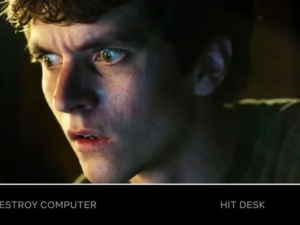“One Glitch Away from Chaos: This Is Black Mirror” 2025

“Each episode is a different world, but all of them share one terrifying truth: we’re already living in the prologue.”
It starts with a tap, a swipe, a chirp from a notification. Your day begins in pixels. Your work, your relationships, your identity—it’s all fun led through a device small enough to fit in your pocket. It’s amazing. It’s empowering. And it’s quietly unsettling.
Now ask yourself: what happens when one line of code goes wrong? When the app that connects you to everything malfunction? When the system that knows what you want before you want it begins to misinterpret your intentions?
That’s the question at the heart of Black Mirror—a series that doesn’t predict the future as much as it diagnoses the present.
We’re not watching science fiction. We’re watching ourselves, through a screen darkly.
Project Kuiper
The Future Isn’t Coming — It’s Already Here

Created by Charlie Brooker, Black Mirror is a British anthology series that launched in 2011 and quickly became a cultural touchstone for the digital age. It doesn’t need aliens or laser guns to scare you. Instead, it uses eerily familiar technologies—rating systems, AI companions, brain implants—and pushes them just a few clicks beyond their current state.
The result? A reflection so sharp, it cuts.
Episodes like “Nosedive” depict a world governed by social scoring, where every smile, favor, and interaction is weighed by a five-star rating. It’s a society obsessed with approval, beauty, and curated perfection—a clear mirror to the Instagram-influencer economy and China’s real-life social credit system.
Or take “The Entire History of You”, where people can replay every memory through a brain implant. Sounds convenient—until jealousy, paranoia, and emotional disintegration kick in. It’s not far from our current state, where text messages are permanent, and every moment is archived, shared, and weaponized.
The Glitch Is Already Here — It’s Us
![]()
What makes Black Mirror so deeply unsettling isn’t that the technology is malevolent. It’s that it works. The systems do what they’re supposed to do. The facial recognition unlocks your phone. The social score tallies your interactions. The AI assistant remembers your preferences.
But beneath that polished surface is a raw truth: technology doesn’t solve human flaws—it magnifies them.
In “White Bear”, we see a world where justice is delivered as entertainment. The punishment fits the crime, but the spectacle is horrifying. In “White Christmas”, digital copies of consciousness are trapped, manipulated, and tortured—not by glitchy software, but by people who think they’re doing their jobs.
These episodes aren’t warnings about machines rising against us. They’re about us misusing the tools we build—intentionally or not—and how quickly morality can blur when power is automated.
It’s not the AI we should fear. It’s the human bias encoded in the AI. The glitch isn’t in the system. The glitch is the system.
Control, Identity, and the Illusion of Choice

So much of Black Mirror circles control: who has it, how it’s enforced, and what it means to lose it.
In “San Junipero”, the show gives us one of its few hopeful visions—a digital afterlife where love transcends time. But even there, choice is complex. Is it really “life” if it’s simulated? Is eternity a blessing or a trap?
Then there’s “Hang the DJ”, where a dating system pairs people based on simulations of their behavior. It’s a clever metaphor for algorithmic matchmaking, but it also asks: how much agency do we have when software is constantly nudging us toward its version of the “right” decision?
From Spotify recommendations to TikTok For You pages, we’re already living in micro-simulations tailored to keep us engaged, compliant, addicted. The system doesn’t force us—it suggests, over and over, until it becomes the path of least resistance.
Watching the Mirror: Why We Keep Coming Back

Why do we watch Black Mirror? Why do we want to see ourselves unravel in dystopian spirals?
Because deep down, we know we’re already halfway there.
We’ve traded privacy for convenience, curiosity for clicks, community for followers. And Black Mirror gives us a place to reckon with that unease. It’s not anti-technology—it’s pro-awareness. It’s trying to shake us awake before the next update makes sleepwalking permanent.
Each episode is a wake-up call disguised as a binge. A meditation dressed as a horror story.
It says: look at the mirror. Look.
Because the reflection staring back might not be you anymore.
Just One Glitch Away

In a world where your fridge talks to your phone, where your child’s face is monitored through AI, where your digital double might outlive your physical self—how far are we from a total system crash?
One Glitch Away from Chaos: This Is Black Mirror

In the age of endless scrolls, algorithmic love, and AI that knows you better than your friends do, it’s easy to forget just how fragile the line is between convenience and catastrophe. That’s where Black Mirror comes in — a chilling reminder that we’re always just one glitch away from chaos.
Charlie Brooker’s dystopian anthology doesn’t just critique tech — it peels back the sleek, glassy surface of our devices to expose the disturbing truths underneath. Each episode is a cautionary tale wrapped in gripping narratives that feel eerily close to our own lives. Whether it’s a world where memories can be replayed like DVR recordings, or social credit scores dictate your very existence, Black Mirror doesn’t stretch reality — it amplifies it.
What makes it so terrifying? It’s not the technology itself. It’s how human we remain, even as the tools around us become inhumanely powerful. The show taps into our deepest fears: being watched, losing control, becoming irrelevant — or worse, replaced.
In a world where one bug in the code could change everything, Black Mirror reminds us that progress without caution is a mirror we might not want to look into too closely.






